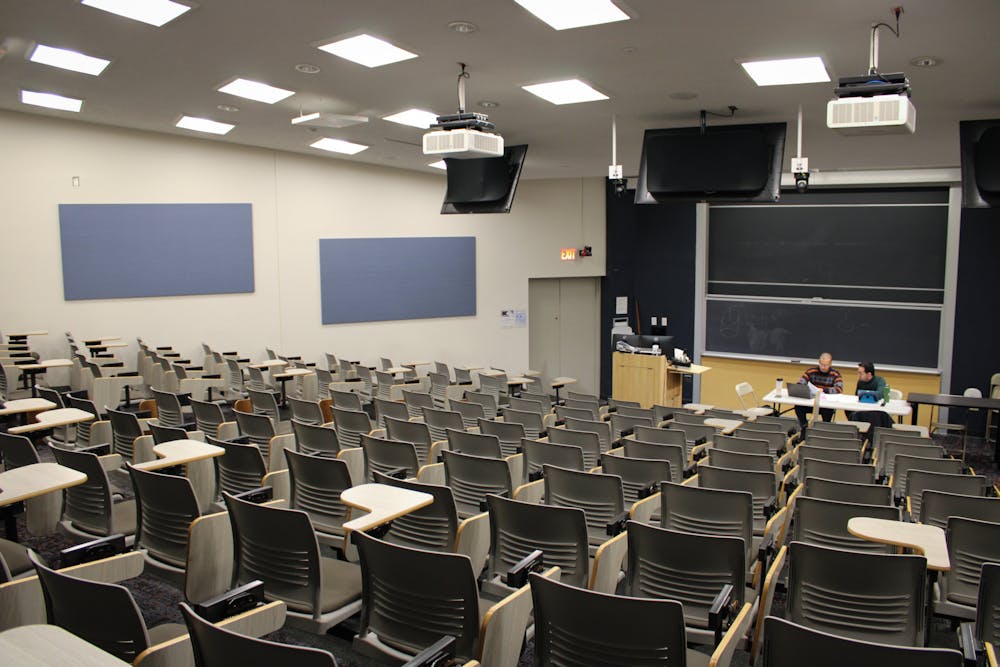
The undergraduate curriculums in various STEM departments in the College of Arts and Sciences and the School of Engineering and Applied Science have undergone changes.
Credit: Sanjana JuvvadiOver the past two years, various STEM departments have seen changes to their undergraduate curriculum, affecting everything from course credits to majors offered.
Changes include the removal of biology major concentrations, new policies surrounding retroactive credit in the Department of Mathematics and the sunsetting of the systems science and engineering major. The Daily Pennsylvanian interviewed STEM departments from both the College of Arts and Sciences and the School of Engineering and Applied Science to explore the reasons behind these changes, how they will be implemented, and what they will mean for future Penn students.
Removal of concentrations for the biology major
Penn’s Department of Biology removed all concentrations for the biology major over the summer for prospective biology majors, starting with the Class of 2027.
Scott Poethig, the department’s undergraduate chair, previously told the DP that this was done to create flexibility within the major and reduce student stress.
“Sometimes, it’s helpful to appreciate that we try to do things for the best interests of our students,” Poethig said. “We’re not in this business to make life more complicated for [the students] by any means.”
Instructional laboratory coordinator and adjunct assistant professor of biology Linda Robinson echoed Poethig.
She recalled a senior majoring in both biology and English who couldn’t graduate with a degree in biology because fulfilling the mechanisms of disease concentration requirements left no room for core biology courses. The student ultimately was not able to graduate with a major in biology.
The new changes also allow students to include any BIOL courses 2000-level or higher and/or up to 3 CUs of approved departmental courses to count as upper-level electives.
Changes to retroactive credit within the Department of Mathematics
The Department of Mathematics is also in the process of restructuring policies surrounding retroactive credit for the introductory math sequence, which is required by numerous departments at Penn.
The sequence typically begins with one of five classes: MATH 1070, MATH 1300, MATH 1400, or MATH 1410. Many first years previously chose to opt out of these by utilizing a process known as retroactive credit. By taking a higher-level math course — typically the next course in the sequence — they can receive retroactive credit for the prior introductory courses.
According to Department of Mathematics Undergraduate Chair Henry Towsner, this process has been standard for more than a decade. Towsner also noted that discussions surrounding phasing out these practices are also not new.
“The biggest issue is that it creates some bad incentives,” Towsner said. “If you’re coming in at the level where maybe [you need to decide if MATH] 1400 or [MATH] 1410 is the right course, for example, the retroactive credit incentivizes students who should have taken [MATH] 1400 to gamble on [MATH] 1410 in the hopes that they get a good enough grade to get retroactive credit, and then a lot of them don’t.”
“So, it created this awkward position where [the student] did badly in [MATH] 1410 and still needed to take [MATH] 1400. … It created a lot of administrative problems,” Towsner added.
The Department of Mathematics began discouraging students from doing this in 2020. Students in the Class of 2024 and Class of 2025 could receive credit for MATH 1400 and either MATH 1410 or MATH 2400, upon completing MATH 2410 with a B or better. The Class of 2026 and Class of 2027 are limited to retroactive credit for only MATH 1400, while the Class of 2028 and beyond are not eligible for any retroactive credit.
Support for this policy, according to Towsner, was widespread within the department and across campus with departments associated with math, including the Engineering School and Wharton School.
Alongside phasing out retroactive credit, the department has also restricted credit available through AP exam scores.
Previously, a score of 5 on the AP Calculus BC exam would entitle students to receive credit for MATH 1400, but students in the Class of 2028 and beyond are only eligible to receive credit for MATH 1300 and a waiver for the MATH 1400 prerequisite in upper-level courses.
Meanwhile, placement exams, another opportunity for students to fast-track through the introductory sequences by placing out of them by passing a qualifying exam, are now limited to students in their first three semesters at Penn.
Replacing the systems engineering major with one in AI
The Engineering School launched The Raj and Neera Singh Program in Artificial Intelligence, offering a bachelor’s degree in AI for students coming fall 2024, the first Ivy League school to do so.
Jointly coordinated by the Department of Computer and Information Science and the Department of Electrical and Systems Engineering, the program includes courses in machine learning, computing algorithms, cognitive science, and electrical and systems engineering, among others.
While this move was highly publicized, the AI major replaced the systems science and engineering major, also offered by the Department of Electrical and Systems Engineering.
“This is a natural evolution of the tools and traditions of systems engineering to fit the AI-powered needs of the 21st century. In recognition of this, the ESE department is sunsetting the Systems Science and Engineering undergraduate major,” the Systems Science and Engineering Major website stated.
“We will continue to support all exiting SSE undergraduate students to their completion of the SSE degree by offering courses and advising,” the website added. “The Systems Engineering masters’ degree continues for those who want to pursue ‘traditional’ systems engineering at Penn.”
The Daily Pennsylvanian is an independent, student-run newspaper. Please consider making a donation to support the coverage that shapes the University. Your generosity ensures a future of strong journalism at Penn.
Donate












